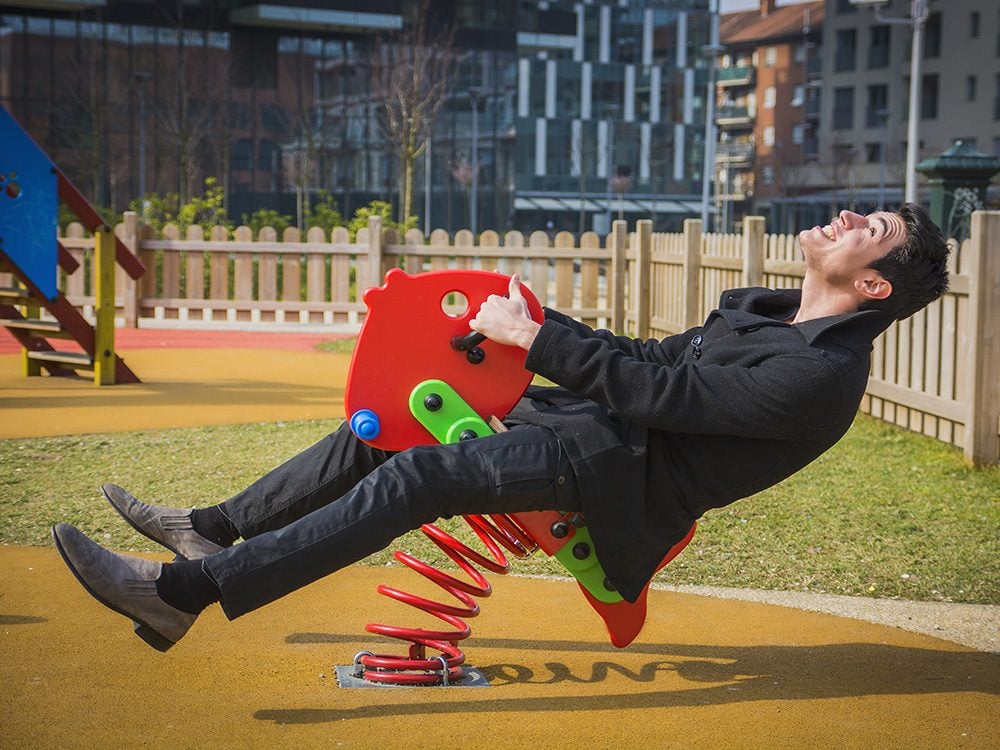
Acting Like a Child Can Improve Your Life
Last summer, Dr. Stuart Brown went to fill a prescription at a pharmacy in downtown Carmel, Calif., and found nine people ahead of him. Instead of getting frustrated about the long wait, he decided to use that time to have fun. “I began bantering with others in the queue,” he says, “and we shared horror stories about the longest lines we’ve ever been in and how we survived them.” The 83-year-old, who wrote 2009’s Play: How It Shapes the Brain, Opens the Imagination and Invigorates the Soul, has spent his career inspiring adults to reclaim a childlike sense of wonder.
Brown’s interest in this area was piqued in 1966, while he was working as a psychiatrist in Texas. As part of a team looking into what was then the worst mass murder in United States history, he learned that Charles Whitman, the man responsible for the crime, had been deprived of play throughout his life. Brown eventually changed his focus: in 1996, he founded a non-profit organization called the National Institute for Play. And he’s onto something – more and more evidence suggests having fun can be seriously beneficial.

1. Add Whimsy While You Work
Throughout 40-plus years of research, Brown has interviewed more than 6,000 people about their recreational habits. He’s found that those who don’t make time to play are prone to depression and a feeling of being stuck in a rut. Early on, we absorb cultural messages that tell us work and play are separate entities. When the latter is missing in a serious way over time, he says, “The consequences are subtle but universal.”
Recently, a CEO hired Brown to help his senior executives tap into the kind of creativity that inspires innovation. One participant, Brown recalls, felt the activity was too “touchy-feely” and claimed he didn’t spend much time playing. But when pushed, the skeptic admitted he enjoys sitting on the floor and having fun with his grandkids. “He told me, ‘I’ve always liked toy trucks. I enjoy making the noises.’ And as he got back into that memory, he brightened up.” By the end of the session, says Brown, the executive was able to understand that much of his deep motivation for his work came from a place similar to the feeling he had during exuberant play as a child.
To spark whimsy in the mundane, Brown suggests taking a cue from your favourite childhood memories of having fun. “While doing your work, try to sustain that feeling,” he says. “Chances are the task won’t be onerous.”

2. Fun Can Lead to Romance
In a paper published in the American Journal of Play in 2012, Pennsylvania State University anthropologist Garry Chick and his team of researchers reported evidence that playful mates have the most luck in love. When the 350 subjects surveyed were asked to rank 16 personality characteristics in order of preference, “playfulness,” “fun-loving” and “sense of humour” made the top five for both sexes – ahead of qualities such as physical attractiveness and income-earning capacity, which we typically assume are top draws for prospective partners.
While playfulness could help a person get more dates in the first place, it can also keep that relationship going. York University research psychologist Amy Muise says both new and long-term couples who regularly engage in fun, novel activities – her field refers to these as “self-expanding” pursuits – are more attracted to each other on a consistent basis.
After following 118 couples over three weeks, she observed that on days when the pairs experienced more self-expansion together, “they reported more desire for each other and were 30 per cent more likely to have sex, which led to them feeling more satisfied in the relationship.” The subjects in her study, Muise says, “took a dance class or a cooking class together. One partner taught the other how to bake a cherry pie. Some took road trips to places they’d never been. One couple even played beer pong together for the first time.”
Making an effort to do something new as a unit, Muise explains, brings back that same feeling a couple has when they’re first dating. “Early in a relationship, it’s easy to feel that novelty – just developing a relationships can be self-expanding. But once we get the sense that we know everything about the person, there aren’t as many eye-opening moments,” she explains. “Seeing a different side of your partner can spark new intrigue.”

3. Creativity Has the Capacity to Help Heal
In times of distress, we often turn to therapy for help, and some therapists use play to spark the healing process. Betty Bedard Bidwell, a co-founder of the Canadian Association of Child and Play Therapy (CACPT), says that while her techniques of art-making, random doodling and role-playing are often used with children, they’re just as effective for adults. For clients dealing with trauma, these techniques can aid personal exploration. “When you’re just sitting there looking at someone while trying to process something traumatic, it’s easy to get overwhelmed,” she says.
Margot Sippel, a psychotherapist and CACPT-certified supervisor in Goderich, Ont., is inspired by Swiss psychologist Carl Jung, who took guidance from myths, art, dreams and other unconscious messages. Sippel draws on the Jung-approved technique of sandplay, which involves clients creating scenes with figures in a small tray of fine sand. The idea, she explains, is to take feelings that are buried deep inside and make them visible. “It’s new information to help us through difficulties,” she says.
Even those not working directly with a therapist can benefit from the self-soothing power of creative play. A study run this past year at Drexel University in Philadelphia found that drawing, sculpting and collage reduce the damaging impact of stress on the body and mind. Seventy-five per cent of subjects aged 18 to 59 had reduced levels of cortisol – the hormone released when a person is afraid or stressed – after only 45 minutes of free artistic play.
If you decide you could use a bit more whimsy in your life, remember: the key to successful play is to focus on the journey, rather than the goal. “We all do it differently,” Brown says. In other words, have fun with it!